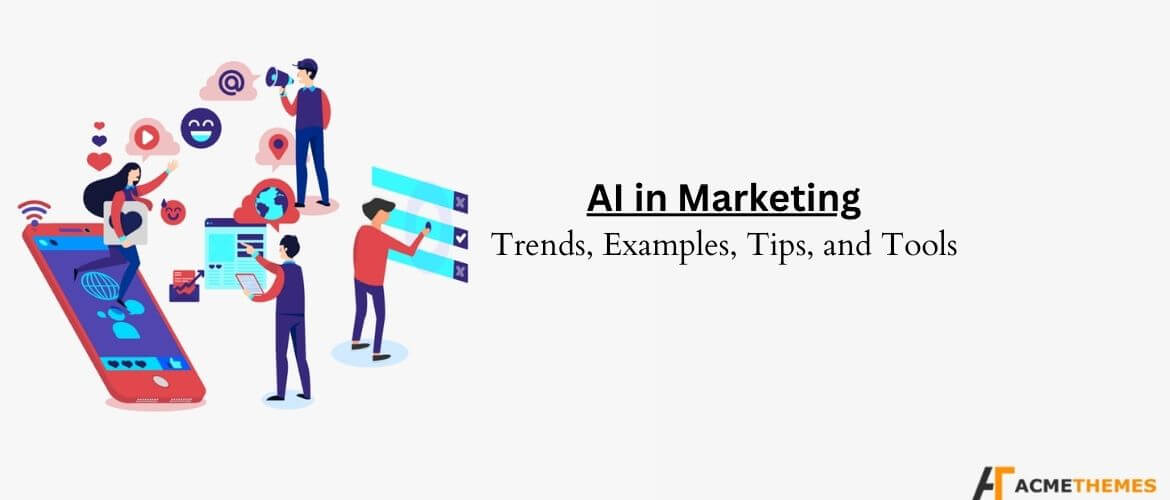AI in Marketing: Unveiling Trends, Examples, Tips, and Tools
Artificial Intelligence( AI) has revolutionized almost every industry, and marketing is no exception. From breaking down vast quantities of data to personifying client experiences, AI has converted the way marketers map and execute their movements.
In this article, we’ll dig into the trends, exemplifications, tips, and tools that showcase the strong part AI plays in present-day marketing.
Table of Contents
How does AI drive marketing?
AI( Artificial Intelligence) in marketing, frequently referred to as AI-driven marketing, is the operation of advanced machine learning algorithms and computational methodologies to break down data, automate tasks, and make intelligent opinions in the field of marketing. AI-driven marketing leverages the power of artificial intelligence to enhance various aspects of the marketing process, from data analysis and client segmentation to campaign optimization and client engagement.
AI-driven marketing involves using sophisticated algorithms to reuse large volumes of data and extract meaningful perceptivity. These insights are also used to inform marketing strategies, upgrade targeting, incorporate client experiences, and eventually amend the effectiveness of marketing campaigns. AI can be integrated into colorful marketing channels and conditioning, including digital advertising, dispatch marketing, social media, content creation, client service, and more.
Trends in AI Marketing:-
Hyperactive Personalization:
AI enables marketers to produce personified experiences by breaking down client data and behavior patterns. This leads to further effective targeting and substantiated contented recommendations, performing in developed engagement and conversion rates.
Chatbots and Virtual aids:
AI-powered chatbots deliver instant client support, answering queries and guiding users through their purchasing expedition. These virtual aids enhance client satisfaction and reduce response times.
Predictive Analytics:
AI algorithms break down factual data to predict unborn trends and outgrowths, helping marketers make informed opinions and allocate resources effectively.
Voice Search Optimization:
With the rise of voice-activated bias, AI-driven voice hunt optimization helps brands adjust their content to conversational queries, amending their visibility in voice hunt results.
Visual Recognition and Search:
AI can break down images and videos to identify objects, scenes, and indeed people, enabling visual hunt capabilities that allow clients to find products based on images.
Illustrations of AI in Marketing:-
Netflix:
The streaming mammoth employs AI to analyze user viewing habits and give personalized satisfied recommendations, building up user engagement and retention.
Amazon:
Amazon’s AI-driven recommendation engine suggests products to clients based on their browsing and purchasing history, contributing to a significant portion of their deals.
Sephora:
The cosmetics retailer uses an AI-powered chatbot to help clients opt for products and try on virtual makeup, enhancing the online shopping experience.
Starbucks:
Through its mobile app, Starbucks uses AI to break down client preferences and position data to suggest nearby stores and offer personalized upgrades.
Adobe Sensei:
Adobe’s AI platform assists marketers in automating repetitious tasks, breaking down data, and optimizing content for better results.
Tips for Implementing AI in Marketing:-
Launch Small: Begin with a focused AI design that aligns with your marketing targets. Whether it’s chatbots for client support or the personalization of email campaigns, a targeted approach can yield significant results.
Data Quality Matters: AI relies on accurate and comprehensive data. ensure your data is clean, organized, and applicable to make the utmost of AI-driven insights.
Human Touch: While AI enhances automation, maintaining a human touch is key. Use AI to streamline processes, but do not lose sight of the significance of genuine interactions.
Continuous literacy: The field of AI is rapidly evolving. Stay modernized on the latest trends, algorithms, and tools to keep your marketing strategies cutting-edge.
AI Tools for Marketers:-
HubSpot:
Offers AI-powered marketing automation and analytics to streamline movements and amend client engagement.
IBM Watson:
Provides AI-driven insights for data analysis, client behavior forecasting, and content optimization.
Google AI:
Offers tools like AutoML for creating custom machine literacy models and enhancing marketing efforts.
Chatfuel:
A user-friendly platform to make AI-driven chatbots for websites and social media platforms.
Rekognition:
Amazon’s AI service enables image and videotape analysis, perfect for visual search integration.
Conclusion
AI’s role in marketing continues to expand, transforming the way brands interact with customers and drive business growth. From hyper-personalization to predictive analytics, AI offers many opportunities to enhance marketing strategies. By embracing these trends, learning from successful examples, following implementation tips, and utilizing AI tools, marketers can stay ahead in the dynamic landscape of modern marketing.
Check out other recent articles:
